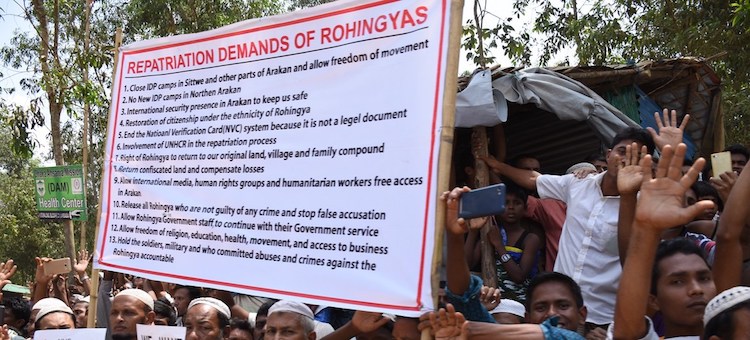Viewpoint by Razia Sultana
The author is a Rohingya lawyer, researcher and educator specializing in trauma, mass rape and trafficking of Rohingya girls and women. She has been working with Rohingya women and girls in the refugee camps in Bangladesh documenting the stories of women and girls who fled Myanmar, and has published two reports: in 2017 and in February 2018. She is coordinator of the Free Rohingya Coalition, Director of Arakan Rohingya National Organization’s (ARNO) women section, and the founder of Rohingya Women Welfare (ROWW). – The Editor
DHAKA (IDN) – One year ago, hundreds of thousands of Rohingya people arrived in Bangladesh from Myanmar with only the clothes on their back and stories of terror, rape, and murder. The UK, the U.S. and others have described the events as ethnic cleansing but I describe them without hesitation as genocide.
As a Rohingya lawyer now working in Bangladesh, I have seen and experienced first-hand the decades of state-sponsored persecution against my people. Genocide is not something that happens from one day to the next – it’s a process. The Myanmar government has been paving the way for a long time by avoiding the word Rohingya, erasing us from the culture and the language.
This has happened alongside politics of exclusion, legal discrimination, and now, finally, a sustained drive to physical extermination. How else can one describe the horrific violence that began one year ago, pushing over 700,000 Rohingya to flee for their lives into Bangladesh in the span of a few months?
The international community needs to recognize the magnitude and long history of what is happening to us and name it.
While the international outcry and massive humanitarian response are important and saves lives, the Rohingya people need action that addresses both the symptoms and the root causes of this crisis.
In Bangladesh, crammed and sprawling refugee camps are now home to a population bigger than Manchester in the UK, or Austin, TX in the U.S. The recent monsoon caused landslides; damaged roads, latrines and wells; and spread waterborne illnesses. Now, cyclone season approaches with its devastating winds and rain.
The Bangladeshi government, international and local aid agencies are working hard to prevent this further disaster, relocating those in the riskiest locations, reinforcing infrastructure, and supplies to prevent disease. It’s a monumental task.
And whilst the Rohingya are also springing to action by reinforcing roads, digging drainage canals, and working with NGOs to keep latrines and water sources functional – there is so much untapped potential within the refugee community to work and provide for themselves. But since the Bangladeshi government doesn’t let refugees work, they’re forced to rely on aid and informal ways to earn little money, which results in women and children being vulnerable to abuse, child marriage and trafficking.
Bangladesh needs to loosen restrictions and unleash the Rohingya’s potential to work. Not only would this help refugees regain a sense of agency and pride, but also lessen the burden on the Bangladeshi government and aid community, and support the local economy.
Also Bangladesh should give the Rohingya formal refugee status, which would give them more rights and the option to resettle.
As a woman, and a lawyer who works on sexual violence, I am particularly disturbed by the situation of women in this crisis. After having escaped the brutal violence in Myanmar, women now face new threats in the unlit camps – rape, sexual assault, murder – making no true safe haven for Rohingya women. It’s why there’s an urgent need to increase funding for women’s rights initiatives.
But beyond addressing the humanitarian crisis – which is the symptom of the genocide against my people – the international community must tackle the root causes. The killings, rapes, violence and suppression must stop immediately. The Myanmar government must be held accountable for its actions. The Rohingya people must be able to live in peace and dignity and benefit from proper citizenship and equal rights, including the right to education and freedom of movement.
Despite Myanmar’s rhetoric, the situation for Rohingya people is showing no signs of improvement. The violence and persecution continues. This harvest season, for example, Rohingya people were not allowed to plant or cut their crops, adding forced hunger and poverty to their misery.
Rohingyas in Bangladesh are grateful for their hosts for providing safety but ultimately, the Rohingya in Bangladesh and those under threat in Myanmar just want one thing: to live in peace and safety in their home country.
As we mark one year since the escalation of violence and forced displacement, we don’t know what the future holds. But my desire is that we will someday mark this terrible milestone with feelings of hope and safety as citizens, in our own homes.
But this won’t happen if the world continues to sit idly by, while a nation tries to exterminate an entire people. The international community have a moral and legal obligation to act. It is time to call this what it is. It is time to use the word genocide. Let us not repeat the errors of history and wait until it is too late. [IDN-InDepthNews – 26 August 2018]
Note: The opinions expressed in this article are the author’s own and do not reflect the view of the International Press Syndicate and IDN.
Photo: Rohingya refugees in Kutupalong settlement in Cox’s Bazar, Bangladesh, hold a sign demanding their repatriation to their homeland in Myanmar. Credit: Caroline Gluck/UNHCR
IDN is flagship agency of the International Press Syndicate.
facebook.com/IDN.GoingDeeper – twitter.com/InDepthNews

